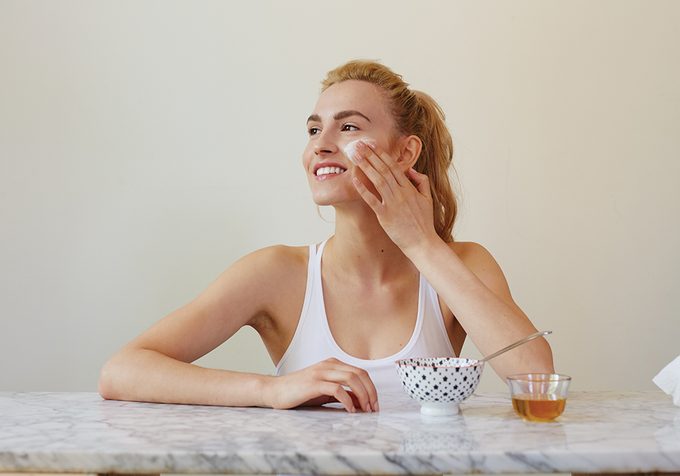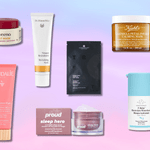Are Probiotics the Key to Clear Skin?
Can the right balance of bacteria give you great skin? The short answer: yes!

Probiotics for Better Skin
If the idea of bugs swarming all over you makes your skin crawl, then this may come as bad news: Your body is actually covered in microscopic bacteria. But fear not, germophobes: These little microbes can be beneficial. It’s well documented that bacteria play an important role in everything from digestion to depression, but now researchers are looking into how micro-organisms affect skin’s overall health. Research has shown that good bacteria in and on your body could have a positive impact on skin disorders such as atopic dermatitis (eczema), acne and rosacea, as well as aging.
Bacteria are an integral part of the microbiome. “The microbiome represents all the bacteria and other micro-organisms living on and inside us,” explains Gregor Reid, director of the Canadian Research and Development Centre for Probiotics and a professor of microbiology, immunology and surgery at Western University in London, ON. “No human is without these organisms, which perform many important functions, such as digestion. These microbes have approximately 150 times the gene power of the human genome and influence much of what we do.”
Not All Bacteria Is Bad
This complex environment of organisms is necessary for good skin and proper immune function, says cosmetic dermatologist Dr. Shannon Humphrey, medical director at Carruthers & Humphrey and director of continuing medical education in the department of dermatology and skin science at the University of British Columbia.
Microbes have an important role to play when it comes to inflammatory skin diseases. Healthy bacteria not only keep harmful bacteria in check but also help the skin’s immune system function optimally.
The skin’s immune system is constantly looking for harmful pathogens that could penetrate the skin and cause problems, says Dr. Humphrey. For example, when it comes to eczema, healthy bacteria help keep Staphylococcus aureus (a harmful pathogenic bacteria that can overgrow during a bad flare-up of eczema) in check.
Bacteria also play a role in those pesky breakouts. Specific strains of the Propionibacterium acnes bacteria are present in the oil glands of people who have acne, and is currently being studied for the role it plays in some people’s inflammatory skin responses to bacteria (that is, why some individuals are afflicted with breakouts and others are not).
For Better Skin, Trust Your Gut
Researchers believe that bacteria influence skin conditions such as rosacea and acne through what they call the “gut-brain-skin axis.” According to this theory, stress alone, or in combination with processed foods, slows down digestion, causing unhealthy bacteria to build up. The bacteria escape the gut and cause inflammation throughout the body, showing up in the form of inflammatory skin conditions. The skin and gut are connected, says Dr. Humphrey, so bacteria constantly migrate between these areas and systemic inflammation on the inside manifests itself in the skin, she says.
That’s where probiotics come in. You’ve probably seen the words “live active bacteria” called out on yogurt labels and plastered on rows of pills available at the health food store. Probiotics may sound like just another trend, but the study of these potentially helpful bugs is at the forefront of the scientific world, and they are being studied for their potential benefits for treating a host of illnesses, from liver disease to inflammatory bowel disease.
Defined as “live micro-organisms that provide a health benefit,” these bugs can help the skin function optimally in many ways. Evidence has shown that oral probiotics, ingested in supplement form or by noshing on fermented foods such as kimche and sauerkraut, can reduce inflammation in the gut, and new evidence is starting to emerge about the role that probiotics play when applied directly to the skin.
The Beauty Bug
“Probiotics applied topically sit on the skin’s surface and prevent skin cells from seeing the bad bacteria and parasites that can cause an immune system response,” explains Dr. Whitney P. Bowe, a dermatologist and clinical assistant professor of dermatology at the Icahn School of Medicine at Mount Sinai in New York.
Probiotics send signals that stop your skin cells from reacting to bad bacteria and in turn cause acne and rosacea, she says. In addition to providing a protective shield against pathogens, topical probiotics can trigger the production of natural moisturizers in the skin that keep the skin barrier healthy, says Dr. Bowe.
“Some strains of probiotics are even capable of shooting little microbial missiles that kill off foreign invaders such as viruses and fungi,” she explains. “Other bacterial strains can send calming signals into the depths of the skin, preventing irritation, redness and premature aging.”
One of Dr. Bowe’s studies, published in the Journal of Drugs in Dermatology, demonstrates that probiotics can restore acidic skin pH, alleviate oxidative stress, lessenphoto-aging caused by UV rays, improve skin barrier function and enhance hair quaity.
While there are a limited number of studies that prove the efficacy of probiotic use (both topically and orally) on the skin specifically, research is mounting and promising. Some studies show that when a mother takes oral probiotics during pregnancy and while breastfeeding, it can have a positive impact on her child’s future risk of developing atopic dermatitis.
Other studies show that topical probiotics can help reduce infection in burn victims and promote healing. There is also anecdotal evidence from psoriasis patients that suggests probiotics may be beneficial in managing the disease.
Using Probiotics At Home
Beauty brands are also jumping on board. Hungarian organic skincare company Éminence launched its first probiotic formula specifically for acne sufferers – Clear Skin Probiotic Masque – in 2010.
“Acne is often treated with harsh chemicals and acids that dry out the skin to reduce the formation of sebum and kill bacteria, but this often results in skin irritation and flaking skin that can ultimately clog pores,” says the brand’s founder and president, Boldijarre Koronczay.
When research started coming out about the benefits of probiotics for both the gut and the skin, the brand – which has always approached skincare holistically – saw the opportunity to develop a probiotic product to help reduce and prevent future breakouts. Éminence has since launched a cleanser and daily moisturizer to its probiotic lineup.
Beauty powerhouse Clinique, famous for its three-step skincare regimen, is also incorporating probiotic technology into its makeup to help consumers who suffer from rosacea. The brand’s Redness Solutions Makeup Broad Spectrum SPF 15 with Probiotic Technology is made with an extract of cultured Lactobacillus plantarum, a natural bacteria found in fermented foods that can help improve the skin’s barrier, in combination with other anti-redness compounds. [Editor’s Note: Find more probiotic beauty products here.]
If you’re worried about the idea of slathering live bacteria all over your carefully cleansed skin, Dr. Bowe reassures that topical probiotics are only sometimes made with living organisms and most products have no live bacteria in them. Both live and derivative bacteria that are no longer living can still be effective in helping to fight acne and rosacea and slow the aging process, she says.
But if you suffer from a chronic skin condition, don’t give up your prescription medications just yet: There are many treatments that have been proven effective that patients should maintain, says Dr. Humphrey. As with any other treatment, there could be side effects, especially if you have a compromised immune system, so speak to your doctor before trying a bacteria-friendly product, she says.
There is huge promise when it comes to treating skin diseases with probiotics, but there is still not enough science to recommend a specific treatment plan. Dr. Bowe’s advice? “When my patients have conditions such as eczema, rosacea and acne, I advise them to eat probiotic-heavy foods and apply a weekly mask made with full-fat yogurt and honey,” she says. Dr. Bowe recommends that patients try to incorporate probiotics into both their skincare regimens and their diets to get the maximum benefits.
Good or bad, getting the right combination of these little creatures can mean the difference between sickness and health. So, while the research is still in the works, getting a little dirty might not be such a bad thing.




